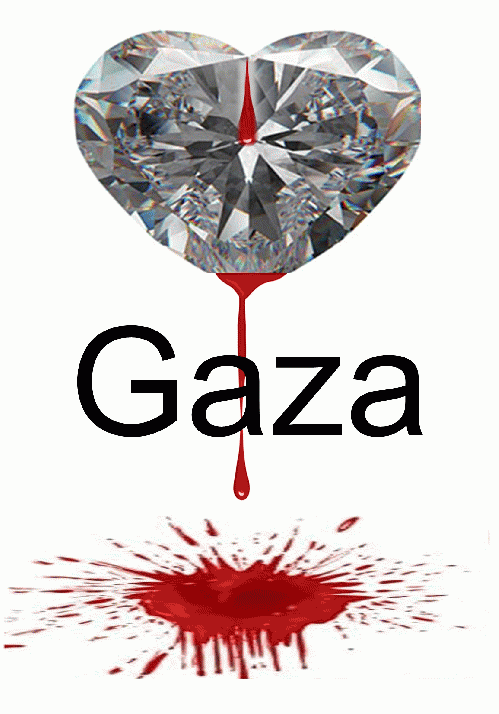Appeals to jewellers and the Kimberley Process to end the trade in Israeli blood diamonds documented on OpEdNew s over a month ago have been ignored. In the interim Israel launched another diamond-funded assault on Gaza, killing 174 Palestinians, including more than 100 civilians, among them at least 37 children and 14 women.
Vested interests in the diamond industry navigated last week's Kimberley Process (KP) Plenary meeting in Washington D.C. through treacherous waters to calmer seas - for the moment. As a result, Israel and Zimbabwe - diamond exporting countries that stand accused of serious human rights violations - avoided potentially crippling sanctions and jewellers worldwide can breathe easier in the period leading to Christmas, the peak diamond-sales season.
With the multi-billion dollar industry holed below the waterline by the re-surfacing of its menaces, blood diamonds, it needed all hands at the pumps to prevent civil society concerns about diamond-funded human rights abuses from scuttling their golden goose. The failure of the KP Plenary to broaden the definition of a "conflict diamond" to ban blood diamonds that fund human rights violations by rouge governments looked set to deliver the coup de gr- ce for the discredited KP system of self-regulation.
In the end, a face-saving coup of sorts deftly smoothed the cracks and the cover-up went unnoticed by the drowsy media which largely ignored the event. Some reports regurgitated the official line without question, giving the impression that all was well, as Zimbabwe, the focus of human rights abuse allegations, was now back in the fold having met KP minimal standards.
The reality, however, was that the gaping hole in the regulations that gave rise to the crisis in the KP remains wide open and KP minimal standards still don't preclude the export of diamonds that fund human rights violations by government forces. Statements from KP members hailing the fact that Zimbabwe had met minimal KP standards were a smoke screen to conceal the KPs failure to reform and to promulgate the conflict-free diamond charade.
The statement by Catherine Ashton, the EU High Representative on the outcome of the Plenary amounts to blatant obfuscation and deception by omission, on a scale that questions the European Commission's commitment to the EU's founding values of democracy and respect for human rights.
It is misleading for the EU to describe as "significant progress" steps taken by the Zimbabwean government to improve "KP compliance" when KP compliance does not require an end to human rights violations by member governments. The EU statement fails to alert people to the fact that and cut and polished diamonds that fund human rights violations continue to evade the regulations and remain KP compliant.
The emphasis on "KP compliance" throughout the EU statement and the assertion that the KP "remains a unique tool for conflict prevention" greatly over -states the effectiveness of the KP. Rather than preventing conflict, the KP facilitates, and provides a marketing boost for, diamonds that fund violence by government forces. The "Note to editors" accompanying the EU statement compounds the deception by stating the KP " requires governments to certify that shipments of rough diamonds are conflict-free ." The KP cannot and does not certify diamonds are conflict-free as diamonds that fund human rights violations by government forces are KP compliant.
It appears that some EU statements are designed to misinform rather than inform.
In 2010, in response to a question from a Member of the European Parliament, Catherine Ashton, speaking on behalf of the EU Commission, stated : "KP implementation cannot be accompanied by human rights violations." Two years later, on the same day that Catherine Ashton issued the EU statement on the outcome of the KP meeting, Israel, a KP member, approved the construction of a further 3000 housing units in illegal West Bank settlements on territory recognised by the UN General Assembly as the Palestinian state less than 24 hours previously. Population transfer to occupied territory is a war crime under the Geneva Conventions.
Days later the EU High Representative repeated the usual EU mantras of extreme concern and extreme worry over Israel's latest violation of international law and, also as usual, gave no indication that any sanctions would be imposed on Israel. The EU continues to allow Israel to flout EU and international agreements and regulations with impunity.
The diamond industry had hoped public concern about blood diamonds and the damage caused to the diamond brand image had been contained and reversed following the introduction of the KP regulations in 2003. The regulations ban "conflict diamonds," which are narrowly defined as "rough diamonds used by rebel movements or their allies to finance conflict aimed at undermining legitimate governments." Despite their limited remit, the regulations are cynically promoted as a guarantee of a conflict-free diamond supply chain by the diamond industry, jewellers and governments -- a total fraud.
(Note: You can view every article as one long page if you sign up as an Advocate Member, or higher).





